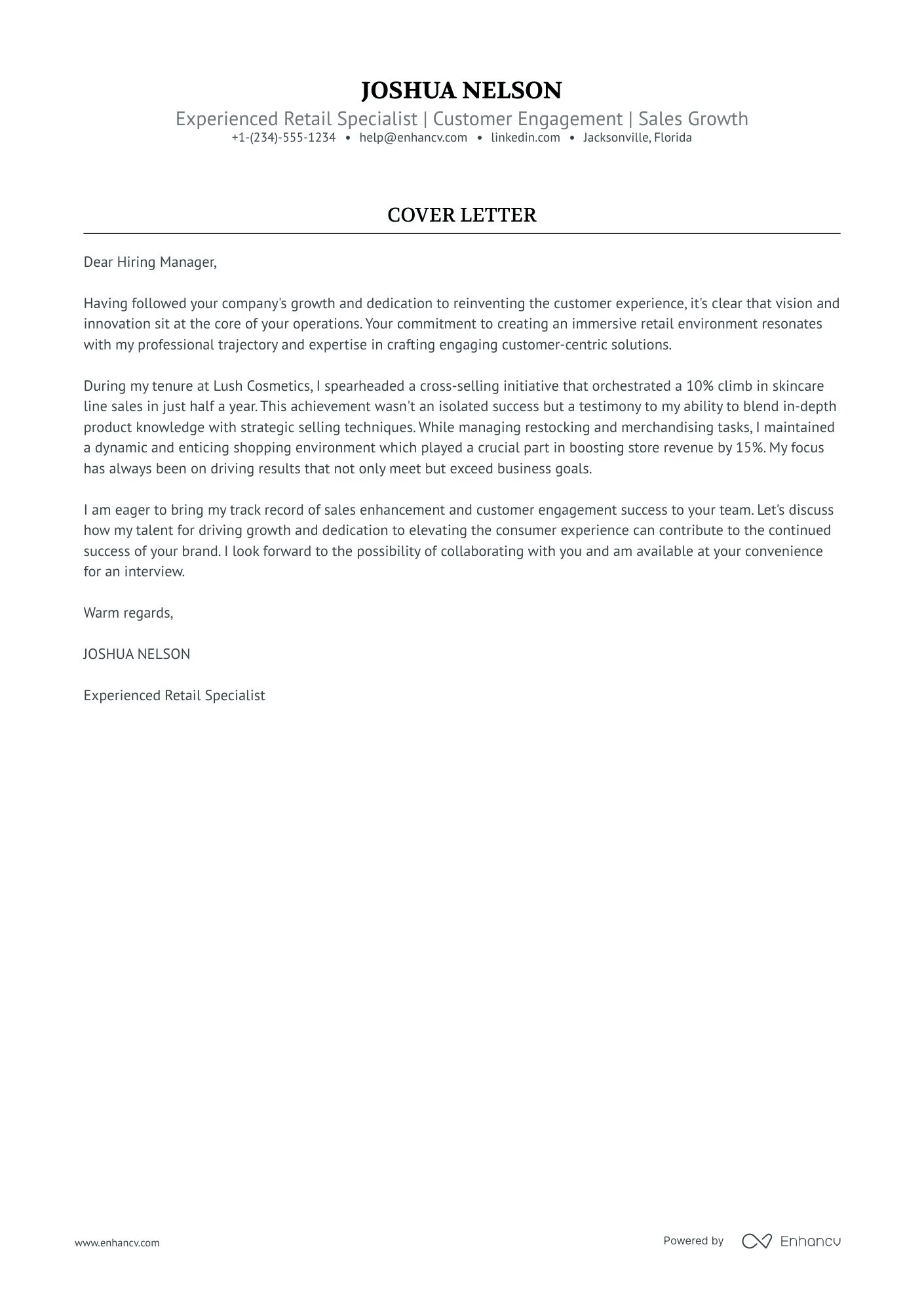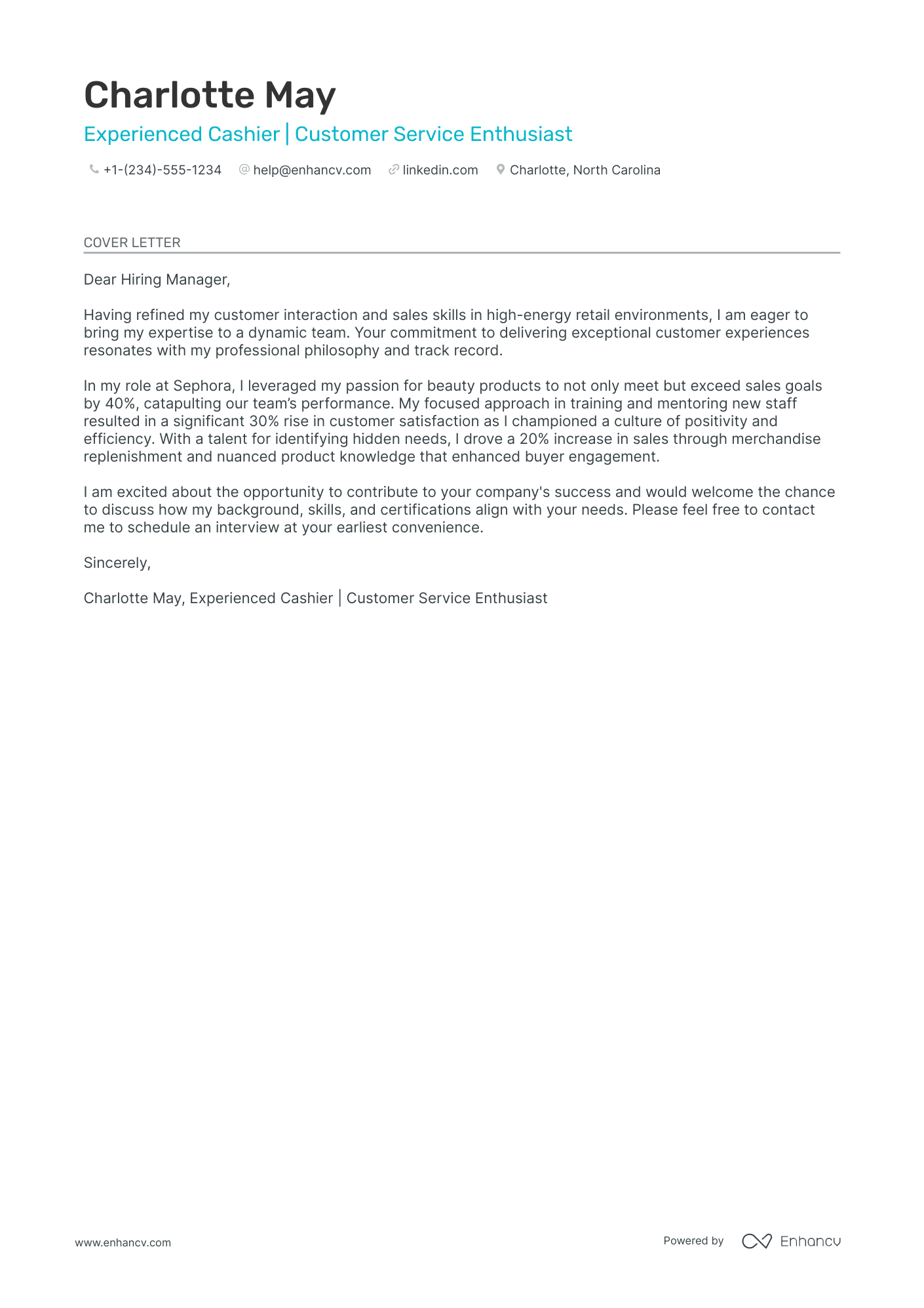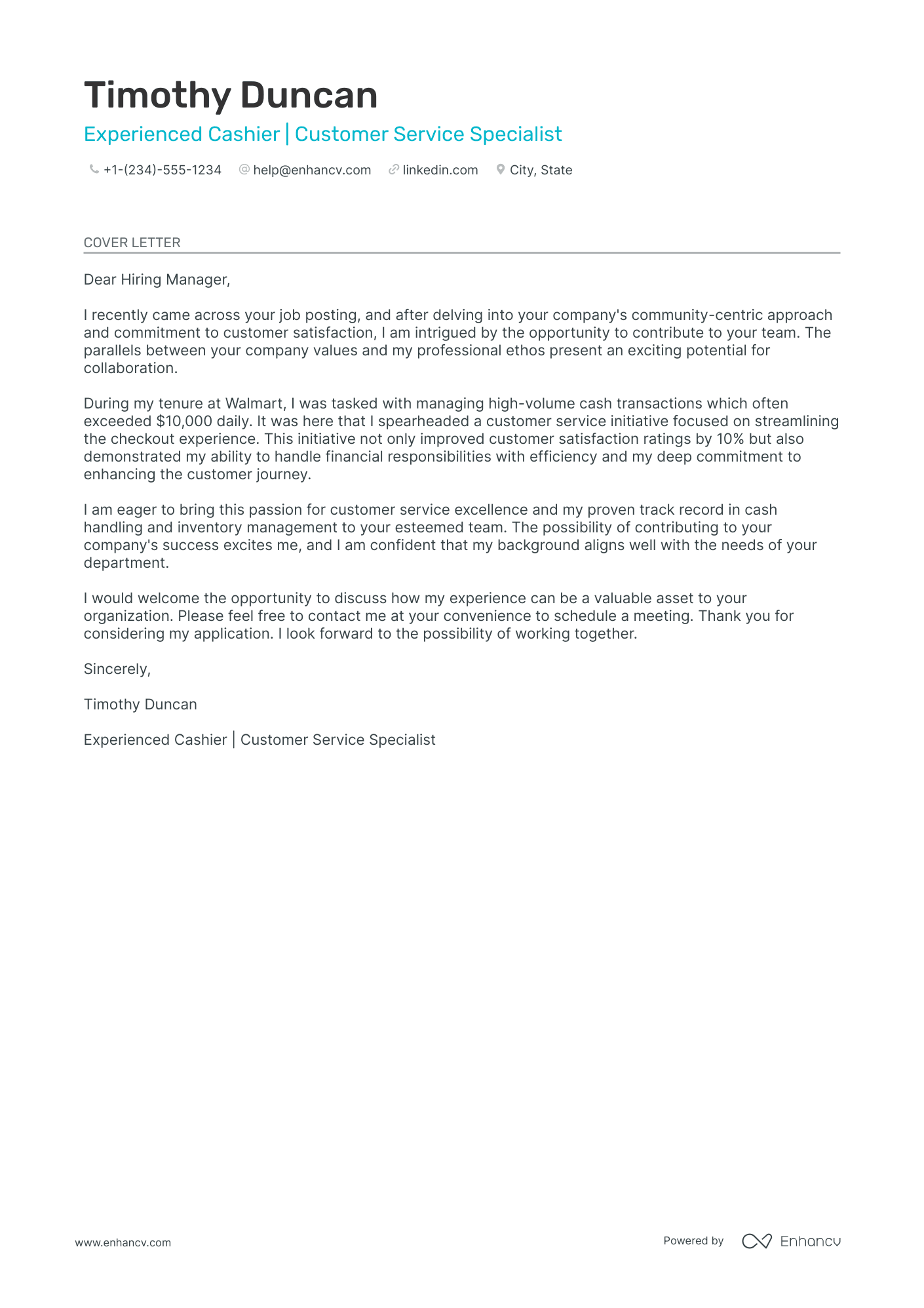Stepping into the job market, you've likely discovered that a cashier cover letter is a must-have addition to your application. It can be daunting, carving out your unique story without echoing your resume, especially when it needs to stay under one page. You know it should highlight your proudest professional moment without slipping into clichés, and maintain a formal tone. But how? In this guide, we'll navigate these challenges, ensuring your cover letter not only complements your resume but also captures the attention of your future employer.
- Writing the essential cashier cover letter sections: balancing your professionalism and personality;
- Mixing storytelling, your unique skill set, and your greatest achievement;
- Providing relevant (and interesting) information with your cashier cover letter, despite your lack of professional experience;
- Finding the perfect format for your[ cashier cover letter, using templates from industry experts.
Leverage the power of Enhancv's AI: upload your resume and our platform will map out how your cashier cover letter should look, in mere moments.
If the cashier isn't exactly the one you're looking for we have a plethora of cover letter examples for jobs like this one:
Drop your resume here or choose a file.
PDF & DOCX only. Max 2MB file size.
Cashier cover letter example
Alex Johnson
San Francisco, CA
+1-(234)-555-1234
help@enhancv.com
- Highlighting specific achievements such as processing 150 transactions daily and maintaining a 99.9% accuracy rate demonstrates quantifiable successes which can be appealing to a potential employer.
- Emphasizing the ability to contribute to a high customer retention rate suggests that the candidate understands and values the importance of customer loyalty and satisfaction in the retail industry.
- Expressing eagerness to bring expertise to the team and a willingness to continue professional development indicates that the candidate is not only competent but also committed to growth and adding value to the company.
What are the basics of the design or format of your cashier cover letter?
To start, here's a reminder for you: the Applicant Tracker System (or software that is used to assess candidate profiles), won't be reading your cashier cover letter.
Recruiters enjoy reading cashier cover letters with a standardized format that uses:
- the same font as the resume (e.g. modern ones like Raleway or Volkhov are prefered over the clichéd Times New Roman or Arial);
- single spacing to keep the content concise and organized (this is all ready for you in our cover letter templates);
- a one-inch margin to wrap around the text, like in our cover letter builder;
- PDF as a file format, as it allows your design (and visual element) to stay the same.
Finally, we can't go on without mentioning the key sections of your cashier cover letter.
In the top one-third, make sure to include a header (with your contact information, name, role, and date), a salutation, and an introduction.
Next, follows the heart and soul of your cashier cover letter or its body.
End your cashier cover letter with a closing paragraph and, if you wish, a signature.
Why spend hours writing a cover letter? Our free cover letter generator can do it for you in seconds.
The top sections on a cashier cover letter
- Header: This includes your contact information, date, and the employer's contact information, which is important to ensure the hiring manager knows who you are and how to reach you.
- Greeting: Starting with a professional salutation directed at the hiring manager or the recruitment team shows that you have done your research and are serious about the position.
- Introduction: Briefly state the position you're applying for, your interest in the role, and a summary of your qualifications that directly relate to being a cashier, such as customer service experience and cash handling skills.
- Body: Elaborate on your previous experience, particularly highlighting responsibilities and achievements that showcase your ability to excel as a cashier, like accuracy, efficiency, and problem-solving abilities.
- Closing: Reiterate your enthusiasm for the opportunity, and mention your availability for an interview. Provide a thank you to the reader for considering your application, which is courteous and leaves a positive impression.
Key qualities recruiters search for in a candidate’s cover letter
- Customer service skills: Cashiers are the face of the store and need to handle queries and concerns with a friendly and professional demeanor.
- Cash handling experience: Recruiters look for candidates who can accurately manage transactions and are trustworthy with money.
- Attention to detail: Being detail-oriented helps prevent errors during transactions and when processing returns or exchanges.
- Efficiency and speed: A good cashier completes transactions quickly to minimize wait times and improve customer satisfaction.
- Familiarity with POS systems: Knowledge of point-of-sale systems and technology is beneficial for a smooth checkout process.
- Flexibility with scheduling: Cashiers often have to work weekends, holidays, and varying shifts, so willingness to work flexible hours is important.
Kick off your cashier cover letter: the salutation or greeting
When writing your cashier cover letter, remember that you're not writing for some complex AI or robot, but for actual human beings.
And recruiters, while on the lookout to understand your experience, would enjoy seeing a cover letter that is tailored to the role and addresses them. Personally.
So, if you haven't done so, invest some time in finding out who's the hiring manager for the role you're applying to. A good place to start would be LinkedIn and the corporate website.
Alternatively, you could also get in touch with the company to find out more information about the role and the name of the recruiter.
If you haven't met the hiring manager, yet, your cashier cover letter salutation should be on a last-name basis (e.g. "Dear Mr. Donaldson" or "Dear Ms. Estephan").
A good old, "Dear HR Professional" (or something along those lines) could work as your last resort if you're struggling to find out the recruiter's name.
List of salutations you can use
- Dear Hiring Manager,
- Dear [Company Name] Team,
- Dear [Department Name] Manager,
- Dear Mr./Ms./Dr. [Last Name],
- Dear [Job Title] Hiring Committee,
Using your cashier cover letter intro to show your dedication
We know just how difficult it is to start writing your cashier cover letter introduction.
There are so many great qualities you have as a professional, which one should you choose?
How about writing up to two sentences about your passion and commitment to the work you do or are set to do?
Try to describe exactly what you enjoy about the potential role.
A positive attitude from the get-go will help you stand out as a motivated cashier professional.
Choosing your best achievement for the middle or body of your cashier cover letter
Now that you have the recruiters' attention, it's time to write the chunkiest bit of your cashier cover letter.
The body consists of three to six paragraphs that focus on one of your achievements.
Use your past success to tell a story of how you obtained your most job-crucial skills and know-how (make sure to back these up with tangible metrics).
Another excellent idea for your cashier cover letter's middle paragraphs is to shine a light on your unique professional value.
Write consistently and make sure to present information that is relevant to the role.
Time to wrap up your cashier cover letter
Writing the closing paragraph of your cashier cover letter is just as important as the salutation.
You have to make it personalized to the job advert and recruiter.
Experienced professionals advise candidates to end with a request or reminder for follow-up. Write that you're grateful for the opportunity, and, at the same time, hint that you're available for the next steps of the process.
Otherwise, you could also conclude your cashier cover letter by facing the future. How do you see yourself, as part of the team? In particular, how would you settle in your new role in the first six months to a year?
Which story should you tell in your cashier cover letter when you have zero experience
Candidates, lacking professional experience in the field - this one is for you.
Your cashier cover letter is an exercise of integrity, honesty, and, above all, spinning a positive narrative around your strengths.
And what better way to capture recruiters' attention than with your most job-relevant achievement (this could be from your internship or volunteering experience)?
Make sure to back up your success with transferrable skills that are relevant to the job (e.g. how your year, studying abroad, has taught you to be more motivated and handle multicultural environments).
Another safe card you can bet on is your career dream: in the body of your cashier cover letter, go into the details of how your ambitions would help make the company you're applying for better.
Key takeaways
We hope this cashier cover letter writing guide has shown you how to:
- Format your cashier cover letter with the mandatory sections (e.g. header, greeting, intro, body, and closing) and select the right font (P.S. It should be the same as the one you've used for your resume);
- Substitute your lack of professional experience with your most noteworthy achievement, outside of work, or your dreams and passions;
- Ensure recruiters have a more personalized experience by tailoring your cover letter not just to the role, but to them (e.g. writing their first/last name in the salutation, etc.);
- Introducing your biggest achievement and the skills it has taught you in your cashier cover letter body;
- Write no more than two sentences in your cashier cover letter introduction to set the right tone from the get-go.
Cashier cover letter examples
By Role








